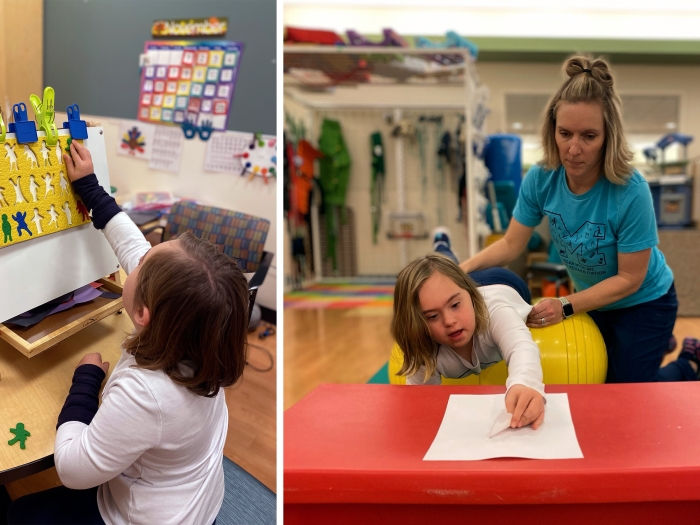A new online program can help patients receive behavioral health care for chronic pain, fatigue and depressed mood from the comfort of their home.
12:00 PM
Author |

For some patients with a chronic condition, the amount of medical appointments they need to attend, and their length of time, can become overwhelming.
"There are many barriers to receiving behavioral health care, in particular," says Anna Kratz, Ph.D., an associate professor of physical medicine and rehabilitation and research psychologist at Michigan Medicine.
"These include financial barriers, such as cost of treatment or transportation, difficulty in finding time to make it to therapy appointments and challenges finding a mental health professional who delivers evidence-based treatment and understands the nuances of your particular condition."
Much of Kratz's work focuses on increasing access to behavioral health care for people with multiple sclerosis (MS).
"People with MS, a disease of the brain and nervous system, commonly experience chronic pain, fatigue and depressed mood," says Kratz, also a member of the University of Michigan Institute for Healthcare Policy and Innovation. "The good news is that there are things that people can do in their everyday lives to both decrease the level of these symptoms and the impact of these symptoms on their life."
MORE FROM MICHIGAN: Sign up for our weekly newsletter
To help patients with MS access behavioral health care for managing these symptoms, Kratz and colleagues developed a free, web-based symptom self-management program called My MS Toolkit.
"The team of psychologists who developed this website took the information, support and skill practice that we would deliver in a therapy session with a person with MS and put it on the web, as to decrease the barriers MS patients may have to getting behavioral health care," she says.
Kratz explains more about the toolkit's unique features:
It's for anyone with MS.
The completely online program is free and available to anyone (not just Michigan Medicine patients) with MS, and it's ideal for people who are having difficulty managing chronic pain, fatigue or depressed mood.
"This website was created to provide a program, supported by research, to anyone who has access to the internet in an effort to increase access to self-management care," Kratz says.
"We realize not everyone lives near a large medical center like Michigan Medicine and even if they do live near a center with qualified therapists for MS, waitlists to see a therapist are often long."
It's easy to follow and convenient.
The program includes nine steps, or modules, that include various components such as tips, videos, audio recordings and worksheets to actively engage participants.
"We created short videos of our development team of psychologists describing some of the more complex concepts of the program," Kratz says. "With the hope that hearing a person describing these ideas in plain language would help the user understand the concepts and give a human face to the program."
She also notes that people with MS are often affected with extreme fatigue or physical disability, which can make it difficult to travel to an appointment.
"The user can engage in the program at their convenience and in the comfort of their home," Kratz says.
A screen scroll of the MS Toolkit website on mobile.
It's a gold-standard treatment.
Kratz says the program is based on the current gold-standard treatment, or most effective treatment based on evidence, in psychology called cognitive behavioral therapy.
LISTEN UP: Add the new Michigan Medicine News Break to your Alexa-enabled device, or subscribe to our daily updates on iTunes, Google Play and Stitcher.
"Cognitive behavioral therapy is a treatment that helps people understand how their thoughts, emotions and behaviors are all related to their experience of symptoms or poor day-to-day functioning," Kratz says. "It helps people develop new ways of thinking and behaving in order to decrease suffering and increase participation in life.
And the program can be used with other therapies people with MS may already be receiving.
"My MS Toolkit is also designed to be used in tandem with other types of therapies and medical interventions for chronic pain, fatigue, and depressed mood," she says.
It was designed with help from those with MS.
Kratz notes the website was developed in collaboration with a team of four stakeholders with MS.
"They provided crucial information on how to design the site and what information would be most helpful for people with MS," she says.
It's beneficial for the support system of a person with MS.
While the program was designed for people with MS, it can also be beneficial for those who support a person with MS.
"Friends, family members and caregivers can also benefit from accessing the program," Kratz says. "MS affects the whole support network, not just the person with the diagnosis. We have built in content for the friends and family of people with MS, so they can feel supported themselves and know how to support their loved one with MS."
Kratz and her colleagues continue to develop and improve My MS Toolkit and hope to create a mobile app, as well as add new features and content in the future. If you are interested in funding these efforts, please contact Kratz Lab.

Explore a variety of healthcare news & stories by visiting the Health Lab home page for more articles.

Department of Communication at Michigan Medicine
Want top health & research news weekly? Sign up for Health Lab’s newsletters today!





